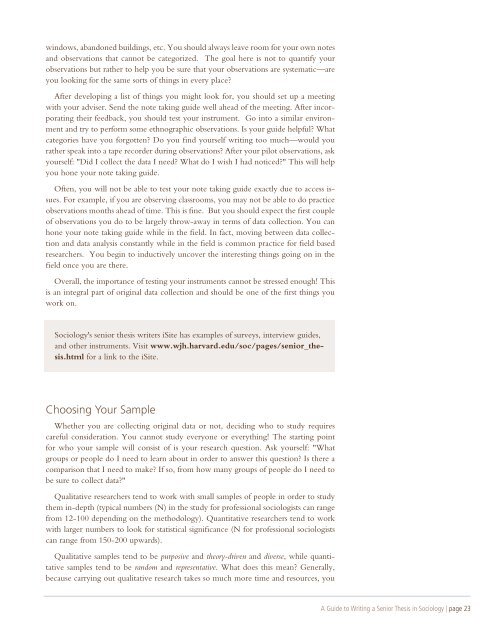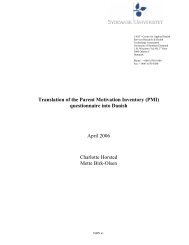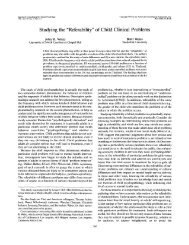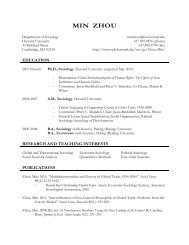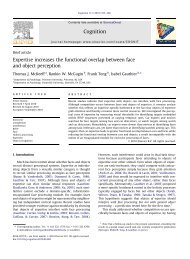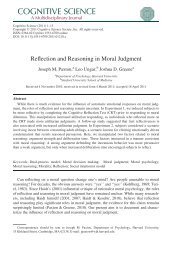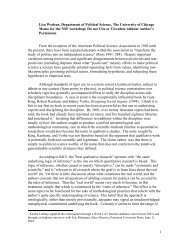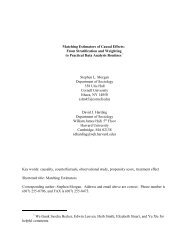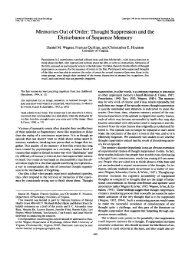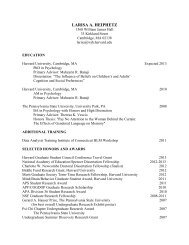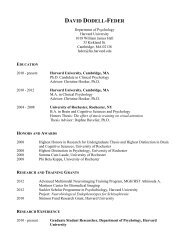A Guide to Writing a Senior Thesis in Sociology - WJH Home Page ...
A Guide to Writing a Senior Thesis in Sociology - WJH Home Page ...
A Guide to Writing a Senior Thesis in Sociology - WJH Home Page ...
Create successful ePaper yourself
Turn your PDF publications into a flip-book with our unique Google optimized e-Paper software.
w<strong>in</strong>dows, abandoned build<strong>in</strong>gs, etc. You should always leave room for your own notes<br />
and observations that cannot be categorized. The goal here is not <strong>to</strong> quantify your<br />
observations but rather <strong>to</strong> help you be sure that your observations are systematic—are<br />
you look<strong>in</strong>g for the same sorts of th<strong>in</strong>gs <strong>in</strong> every place?<br />
After develop<strong>in</strong>g a list of th<strong>in</strong>gs you might look for, you should set up a meet<strong>in</strong>g<br />
with your adviser. Send the note tak<strong>in</strong>g guide well ahead of the meet<strong>in</strong>g. After <strong>in</strong>corporat<strong>in</strong>g<br />
their feedback, you should test your <strong>in</strong>strument. Go <strong>in</strong><strong>to</strong> a similar environment<br />
and try <strong>to</strong> perform some ethnographic observations. Is your guide helpful? What<br />
categories have you forgotten? Do you f<strong>in</strong>d yourself writ<strong>in</strong>g <strong>to</strong>o much—would you<br />
rather speak <strong>in</strong><strong>to</strong> a tape recorder dur<strong>in</strong>g observations? After your pilot observations, ask<br />
yourself: "Did I collect the data I need? What do I wish I had noticed?" This will help<br />
you hone your note tak<strong>in</strong>g guide.<br />
Often, you will not be able <strong>to</strong> test your note tak<strong>in</strong>g guide exactly due <strong>to</strong> access issues.<br />
For example, if you are observ<strong>in</strong>g classrooms, you may not be able <strong>to</strong> do practice<br />
observations months ahead of time. This is f<strong>in</strong>e. But you should expect the first couple<br />
of observations you do <strong>to</strong> be largely throw-away <strong>in</strong> terms of data collection. You can<br />
hone your note tak<strong>in</strong>g guide while <strong>in</strong> the field. In fact, mov<strong>in</strong>g between data collection<br />
and data analysis constantly while <strong>in</strong> the field is common practice for field based<br />
researchers. You beg<strong>in</strong> <strong>to</strong> <strong>in</strong>ductively uncover the <strong>in</strong>terest<strong>in</strong>g th<strong>in</strong>gs go<strong>in</strong>g on <strong>in</strong> the<br />
field once you are there.<br />
Overall, the importance of test<strong>in</strong>g your <strong>in</strong>struments cannot be stressed enough! This<br />
is an <strong>in</strong>tegral part of orig<strong>in</strong>al data collection and should be one of the first th<strong>in</strong>gs you<br />
work on.<br />
<strong>Sociology</strong>'s senior thesis writers iSite has examples of surveys, <strong>in</strong>terview guides,<br />
and other <strong>in</strong>struments. Visit www.wjh.harvard.edu/soc/pages/senior_thesis.html<br />
for a l<strong>in</strong>k <strong>to</strong> the iSite.<br />
Choos<strong>in</strong>g Your Sample<br />
Whether you are collect<strong>in</strong>g orig<strong>in</strong>al data or not, decid<strong>in</strong>g who <strong>to</strong> study requires<br />
careful consideration. You cannot study everyone or everyth<strong>in</strong>g! The start<strong>in</strong>g po<strong>in</strong>t<br />
for who your sample will consist of is your research question. Ask yourself: "What<br />
groups or people do I need <strong>to</strong> learn about <strong>in</strong> order <strong>to</strong> answer this question? Is there a<br />
comparison that I need <strong>to</strong> make? If so, from how many groups of people do I need <strong>to</strong><br />
be sure <strong>to</strong> collect data?"<br />
Qualitative researchers tend <strong>to</strong> work with small samples of people <strong>in</strong> order <strong>to</strong> study<br />
them <strong>in</strong>-depth (typical numbers (N) <strong>in</strong> the study for professional sociologists can range<br />
from 12-100 depend<strong>in</strong>g on the methodology). Quantitative researchers tend <strong>to</strong> work<br />
with larger numbers <strong>to</strong> look for statistical significance (N for professional sociologists<br />
can range from 150-200 upwards).<br />
Qualitative samples tend <strong>to</strong> be purposive and theory-driven and diverse, while quantitative<br />
samples tend <strong>to</strong> be random and representative. What does this mean? Generally,<br />
because carry<strong>in</strong>g out qualitative research takes so much more time and resources, you<br />
A <strong>Guide</strong> <strong>to</strong> <strong>Writ<strong>in</strong>g</strong> a <strong>Senior</strong> <strong>Thesis</strong> <strong>in</strong> <strong>Sociology</strong> | page 23


